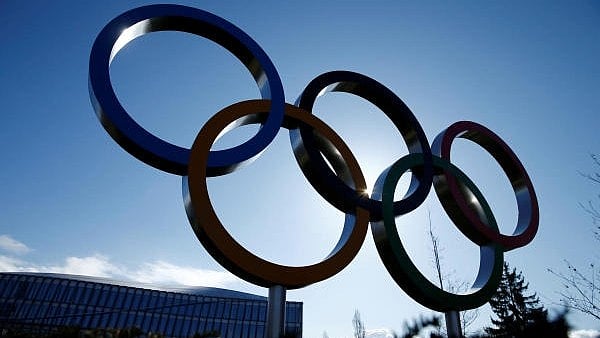
The rings are pictured in front of the International Olympic Committee (IOC) in Lausanne, Switzerland. Image for representation only
Credit: Reuters File Photo
In the corridors of India’s sports administration, ambitious conversations about hosting the Olympic Games in 2036 or 2040 have gained momentum.
The vision of bringing the prestigious Five Rings event to the country evokes national pride and signals India’s growing global influence.
For a rapidly developing economy, the Olympics represent both a symbolic milestone and a catalyst for infrastructure growth.
Yet this aspiration comes with substantial challenges: the scale of financial investment, the need for world-class sporting facilities across multiple disciplines, and the urgency to raise India’s competitive standards in Olympic sports. The current approach—acknowledgement that economic benefits should not be the primary motivation—is a welcome departure from the oft-exaggerated promises of financial gains.
Historical evidence shows that Olympic host cities consistently fail to deliver the economic windfalls originally projected. Many have been left with abandoned facilities and long-term financial burdens. The 2014 Sochi Winter Olympics, for instance, imposed an extraordinary $55 billion burden on the Russian economy—far exceeding the initial $12 billion estimate. Research also reveals that the Olympic Games exceed their projected budgets by an average of 172 per cent. It is therefore wise to treat the Olympics as a tool for societal change, athletic progress, and the promotion of physical education—not as a ticket to economic prosperity.
However, this vision demands far more concrete planning than is currently visible. India must place greater emphasis on post-bid legacy rather than focusing solely on securing the bid—a shift that would strengthen the country’s case for hosting the Games.
India faces a contradiction in its sporting landscape. Despite over 65 per cent of the population being under 35—amounting to more than 900 million people—fewer than 10 per cent actively engage in sports, and consistent engagement is even lower. Across much of the country, sports infrastructure is woefully inadequate. Before pursuing the Olympic dream, the immediate priority should be building basic sports infrastructure and creating pathways for athletic development that function independently of any Olympic bid. While a 10-12-year preparation timeline is reasonable, it will amount to little without immediate and substantial investments in grassroots sports infrastructure.
Planning documents rightly emphasise minimising the use of public funds and ensuring strategic budget management. But these principles must be translated into clear funding models that protect taxpayer interests while delivering world-class facilities. Leveraging the sports infrastructure of universities, sports academies, and even schools through public-private partnerships is a promising approach—provided the implementation is carefully designed and monitored.
Transportation and environmental planning—both critical to a successful Olympic bid—require particular attention. India’s urban centres already struggle with traffic congestion and environmental degradation. According to the World Health Organisation, 14 of the world’s 15 most polluted cities are in India. Without transformative solutions for urban mobility and sustainability, Olympic hosting could aggravate rather than ameliorate these issues.
Some Olympic Games have catalysed extraordinary transformations. But instead of imitating these models, India must innovate—adapting lessons to its own context. The 1992 Barcelona Olympics exemplify strategic planning, helping the city transition from dictatorship to democracy while sparking an urban renaissance. Tourism rose by 30 per cent, and the city’s GDP grew by 4.5 per cent in the years following the event. Paris, with two previous hosting stints and the latest 2024 Games, has highlighted cultural heritage while investing in temporary infrastructure, restoring the Seine River with an investment of $1.5 million, and upgrading existing facilities. Los Angeles, which hosted the Games in 1932 and 1984 and is preparing for 2028, has shown how robust university infrastructure can support a legacy-focused model. The University of California, Los Angeles (UCLA), for example, experienced notable growth in student enrolment and economic activity around the Games. India must craft its own model—one that blends international best practices with local wisdom to create a hosting model that serves its specific development goals.
The IOC’s new bidding process, which emphasises partnership with the Future Host Commission rather than expensive consultancy , offers India a more accessible pathway. However, seizing this opportunity requires elevating Indian Olympians to the forefront of the campaign, using them as ambassadors in global forums. India’s diaspora of about 35.42 million is another untapped resource that could provide support, visibility, and resources for the Olympic mission.
To turn ambition into action, several prerequisites demand immediate attention: comprehensive sports policy reforms, transparent financial frameworks, meaningful public engagement, and infrastructure development decoupled from Olympic justification. These fundamentals must precede—not follow—a formal bid.
The Olympic Games offer a powerful stage for national prestige and global cooperation. But the true measure of India’s sporting maturity will not be whether it hosts the Olympics but whether it creates sustainable, inclusive athletic ecosystems that thrive irrespective of the Games. As India considers its most ambitious sporting endeavour yet, policymakers must prioritise foundational development over symbolic achievement.
(Utsav is the director, Bharat Centre of Olympic Research and Education, and Ankit is an assistant professor, School of International Cooperation, Security and Strategic Languages, Rashtriya Raksha University)